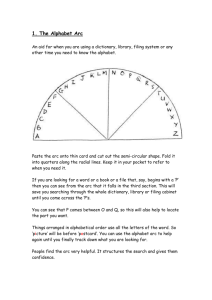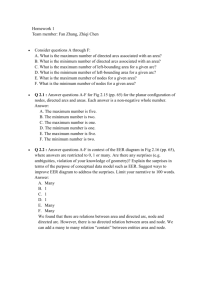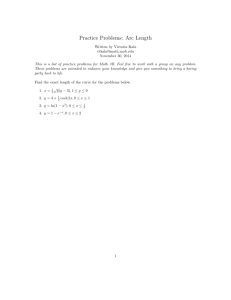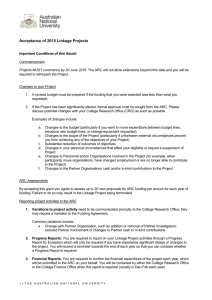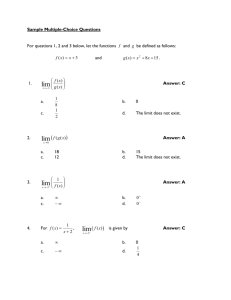Sample A4 portrait cover sheet with new margins
advertisement
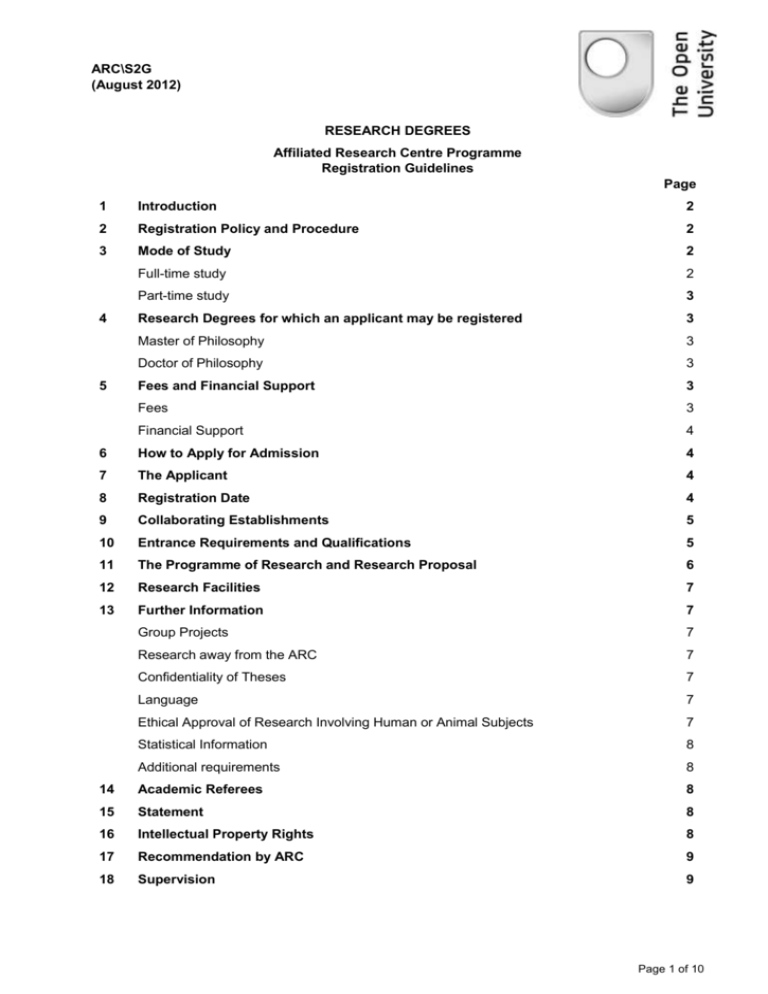
ARC\S2G (August 2012) RESEARCH DEGREES Affiliated Research Centre Programme Registration Guidelines Page 1 Introduction 2 2 Registration Policy and Procedure 2 3 Mode of Study 2 Full-time study 2 Part-time study 3 Research Degrees for which an applicant may be registered 3 Master of Philosophy 3 Doctor of Philosophy 3 Fees and Financial Support 3 Fees 3 Financial Support 4 6 How to Apply for Admission 4 7 The Applicant 4 8 Registration Date 4 9 Collaborating Establishments 5 10 Entrance Requirements and Qualifications 5 11 The Programme of Research and Research Proposal 6 12 Research Facilities 7 13 Further Information 7 Group Projects 7 Research away from the ARC 7 Confidentiality of Theses 7 Language 7 Ethical Approval of Research Involving Human or Animal Subjects 7 Statistical Information 8 Additional requirements 8 14 Academic Referees 8 15 Statement 8 16 Intellectual Property Rights 8 17 Recommendation by ARC 9 18 Supervision 9 4 5 Page 1 of 10 1 Introduction This document outlines the arrangements and procedures for the registration of students in Affiliated Research Centres (ARCs) to read for a research degree of The Open University. It is intended to provide information for research degree co-ordinators in ARCs, supervisors and applicants. If you have any queries or require advice please contact the relevant member of the research degrees team who will be happy to help you: Subject Area Research Degrees Adviser Contact details Science Louise Luckham +44 (0)1908 652296 Julie Williams +44 (0)1908 653117 Anita Long Research-Degrees-ARC-SE@open.ac.uk Julie Williams +44 (0)1908 653117 Architecture and Urbanism Research-Degrees-ARC-SE@open.ac.uk Arts, Theology and Religious Studies Louise Luckham Business and Management +44 (0)1908 652296 Research-Degrees-ARC-SE@open.ac.uk Social Science Health and Social Care Research Degrees Office The Open University Milton Keynes MK7 6AA 2 Registration Policy and Procedure The research degree co-ordinator, in consultation with the proposed supervisors, applies to register a student with The Open University by submitting a completed Application for Registration form. The application is considered by or on behalf of The Open University Research Degrees Committee, which has the overall authority to admit students to the research degree programme. Once an application for registration is approved The Open University Research Degrees Office will notify the research degree co-ordinator by sending a letter of registration. 3 Mode of Study Students in ARCs are either registered to study full-time or part-time. 3.1 Full-time Students registered to study full-time must meet the following criteria: (a) The student must either: be in receipt of a grant, bursary or studentship of not less than three and not more than four years duration for the project for which s/he is seeking registration have funds available which will: or support her/him and pay any fees due support the project costs be available for a minimum of 3 and a maximum of 4 years. Page 2 of 10 (b) The student must not have any other paid employment during the period of the studentship (other than part-time for a maximum of 6 hours per week1). If full-time registration is being sought details of the funding arrangements must be provided on a separate sheet2. This must show the duration of the funding and confirm that it is sufficient to cover the student’s living costs, fees and project related costs. 3.2 Part-time Part-time registration enables you to study for a research degree without giving up work or other commitments. There are no prescribed hours for students registered to study part-time however it should be noted that the timescales for part-time registration3 indicate that students need to work at least 50% of full-time in order to complete successfully. 4 Research Degrees for which an applicant may be registered Applicants may indicate on the application form which of the following research degrees they wish to be registered for. If the application is accepted, they will initially be registered for an MPhil. Whether or not they are subsequently registered for PhD will be determined following a review of progress at the end of a probation period, (twelve months for students registered to study full-time and 24 months for students registered to study part-time). All students are initially registered for an MPhil degree. 4.1 Master of Philosophy (MPhil) Students for this degree undertake a research programme that shows proficiency in research methods and techniques and shows an adequate knowledge of the literature. A thesis for the MPhil degree should be not more than 60,0004 words in length. This thesis must show: 4.2 (a) evidence of proficiency in research methods and techniques (b) an adequate knowledge and/or understanding, critical evaluation and discussion of the area of study (c) evidence of a distinct contribution to knowledge in the field of study. Doctor of Philosophy (PhD) The thesis submitted for this degree should be not more that 100,0004 words in length and should: (a) give evidence of the student’s ability to undertake further research without supervision (b) make a significant contribution to knowledge (c) contain a substantial amount of material worthy of publication. 5 Fees and Financial Support 5.1 Fees The registration fee for students in ARCs is payable annually as a single, composite fee. The fee is payable on initial registration and then yearly on 1 October up to and including the year in which a student submits his/her thesis for examination. An invoice for the fee will be sent to the ARC, as the institution is responsible for collecting the fees and transmitting payments to The Open University. The student, however, is liable for the amount due. 1 2 3 4 Where the employment is directly related to her/his research degree this may be aggregated over a period to allow for longer periods of employment. ARCs may inform the Research Degrees Office of the general terms and conditions of all full-time students within that organization. If this information has been provided it need not be repeated with every new registration. 6 years maximum registration period Including footnotes, bibliography and appendices Page 3 of 10 If the student registers part way through the academic year the ARC will be invoiced a proportion of the annual fee depending on the quarter in which you registered. The proportion of the fee for which a student is be liable, if registered within certain dates, is set out below. 1 October - 31 December: 1 January - 31 March: 1 April - 30 June: 1 July - 30 September: (100% fee) (75% fee) (50% fee) (25% fee) For ARC students who register on or after 1 October 2007, who submit their thesis part way through an academic year and meet the submission criteria5, there may be a proportional fee reimbursement. Eligible ARC students, who submit their theses within the following dates are entitled to a fee reimbursement as set out below: 1 October - 31 December: 1 January - 31 March: 1 April - 30 June: 1 July - 30 September: (75% fee) (50% fee) (25% fee) no fee reimbursement Information about the current fee levels are notified annually to the research degree coordinator and can be obtained from The Open University Research Degrees Office upon request. Fees will increase annually. 5.2 Financial Support For information on financial support available to ARC students, please refer to the Student Handbook. http://www3.open.ac.uk/arc-handbook/ 6 How to Apply for Admission ARCs should submit a completed Application for Registration form to the Research Degrees Office, for consideration by or on behalf of The Open University Research Degrees Committee. Please ensure that the up to date form is used for each application. Forms are available from the website: http://www.open.ac.uk/research/research-degrees/affiliated-research-centreprogramme/affiliated-research-centres.php In completing the application form, applicants are asked to confirm that they are applying for registration on the terms and condition set out in the Student Handbook and on the basis of the University’s Student and Research Degree Award Regulations, which are provided in the handbook. It is therefore essential that all applicants have access to the Handbook and these Registration Guidelines (ARCS2G) when they complete their application form. The following sections provide more information about the application requirements. The research degree co-ordinator should check the completed Application for Registration form carefully before submitting it to the Research Degrees Office as incomplete forms will cause delays in the consideration of the application. A checklist has been included as part of the application form to help ensure all information is provided. 7 The Applicant The information provided here will form the basis of the applicant’s personal record with The Open University. It is important, therefore, that correct information is given. For further information about the data we hold and our data protection policy, please refer to the Student Handbook. 5 Research Degrees Office must be in receipt of a satisfactorily completed ARC13 form within one month of the stated thesis submission date otherwise the fee will be reimbursed at the rate relevant to the quarter in which the completed ARC13 form was received. Students must have been invoiced for 100% ARC level student fee for that academic year. Page 4 of 10 8 Registration Date Students’ registrations always start on the first day of a month. Applications to register a student can be sent to the Research Degrees Office at any time; however, the registration cannot be backdated further than the first day of the month following receipt of the application by the Research Degrees Office. Applications should be made in advance of the student commencing her/his research degree studies as work undertaken prior to registration may not be included in the thesis. 9 Collaborating Establishments If an organisation, other than the ARC, is providing facilities for a student’s research and a formal arrangement for collaboration on the research exists, the name of that organisation should be entered into this section of the form. The Open University encourages co-operation between educational establishments and industrial, commercial, professional and research organizations for the purpose of research leading to the award of research degrees. This co-operation is intended to: (a) encourage outward looking and relevant research (b) extend the student’s own experience and outlook on the work (c) provide a wider range of experience and expertise to assist in the development of the project (d) be mutually beneficial The ARC may set up formal co-operation with one or more other bodies, referred to as collaborating establishments. A formal letter from the collaborating establishment(s) confirming the agreed arrangements should be submitted to the Research Degrees Office with the application for registration. Formal collaboration usually means that students will use facilities and other resources, which may include supervision provided jointly by the collaborating establishment and the ARC. It is however, expected that students will spend at least half of their period of registration based in their ARC. Details of the time (including dates) to be spent at the collaborating establishment must be included with the application. The name(s) of the collaborating establishment(s) will appear with the name of the ARC on the student’s thesis title page and on the degree certificate. 10 Entrance Requirements and Qualifications When completing the form the applicant should provide full information about their qualifications including where they studied, the course title, the classification of the award or final mark and the date and name of the awarding body. If the qualifications are from higher educational institutions outside the UK, the exact name of the degree awarded and the country of the award should be provided. To avoid confusion, the title of the qualification, nor the mark awarded, should not be translated into English or English equivalent. If full information about the qualifications is not provided, consideration of the application may be delayed whilst these details are checked with the ARC. To be eligible for admission to read for a research degree it must be shown that the applicant is suitably prepared for postgraduate study in her/his chosen area. The Open University Research Degrees Committee will normally only approve the registration of applicants who satisfy the University’s minimum entrance requirements, which are: 6 an upper second class honours degree from a UK university or the former CNAA6, or the equivalent, in a relevant subject area, or Council for National Academic Awards Page 5 of 10 a postgraduate master’s degree from a UK University or the former CNAA, or the equivalent, in a relevant subject area. An applicant who does not meet this minimum requirement may, exceptionally, be considered if it can be shown that her/his qualifications, professional experience and/or previous research publications have provided suitable preparation for postgraduate research in her/his chosen field. An ARC applying to register a student who does not meet the minimum entrance requirements should include with the application form two references as described in section 14 below. A case in support of the student’s registration should also be provided with the Application for Registration form. This case should show: (a) how the applicant has demonstrated her/his suitability to undertake postgraduate research (b) reference to any publications or other objective evidence of the student’s suitability (c) confirmation that the student’s degree result was not a true reflection of her/his suitability to undertake the proposed research. The registration of an applicant without either a first degree or a postgraduate master’s qualification will be approved only in exceptional circumstances. The Open University Research Degrees Committee normally expects unqualified applicants to successfully complete suitable undergraduate/postgraduate master’s study before re-applying for registration. Non graduate applicants for registration are expected to be able to: (a) demonstrate that they have an adequate general academic background in their subject area and the ability to acquire the skills and techniques necessary for the proposed research project (professional qualifications or experience alone will not necessarily provide this) (b) provide evidence of research ability in the form of published papers in refereed journals or through a significant academic contribution to university level research. The nature of the contribution to any published work should be made clear together with an indication of the standing of the journals concerned. An applicant with qualifications from outside the UK can be registered if her/his qualifications are of equivalent standing to those awarded by UK institutions of higher education. The Research Degrees Office uses The National Recognition Centre for the UK (UK NARIC), the national agency responsible for providing information and advice about academic qualifications from all over the world, for information about equivalences. If the equivalence to an appropriate UK qualification cannot be verified, the ARC will be asked to provide two references to support the application, as described in section 14 below. 11 The Programme of Research and Research Proposal The application must include a research proposal of no longer than 5 pages in length, which should indicate: (a) the topic or area to be investigated (b) the problem or hypothesis to be tested (c) the methods and techniques to be used in the investigation (d) the relationship of the proposed research to the published literature and to current research in the applicant’s field and an indication of the contribution to knowledge the thesis would make (particularly important for students who wish ultimately to undertake a PhD) (e) details of the applicant’s previous work in the proposed field (f) a timetable for completion of the project. (g) If it is intended that the thesis will contain a non-book component in accordance with research degree regulation RD6.2.2, a proposal for substitution of book with non-book media must be included in the research proposal with an explanation of how the Page 6 of 10 non-book component is intended to locate and exemplify the ideas developed in the thesis7. The balance of evidence and argument in the proposal should reflect the anticipated balance between book and non-book material in the final thesis. 12 Research Facilities ARCs should agree with the student the laboratory, computing and library facilities that will be available for research before the student starts her/his research degree. These should be stated clearly in the Application for Registration form. Information about Open University resources available to registered ARC students can be found in the Student Handbook. 13 Further information The applicant should indicate here, and provide further information on a separate sheet, if there are any special aspects to the proposed thesis such as: 13.1 Group Projects If the student’s work forms part of a group project the application should make clear how the student’s work fits with the project as a whole and how it will be differentiated to enable her/him to submit a thesis which is clearly her/his own work. 13.2 Research away from the ARC Where research will be undertaken away from the ARC information should be provided. It is expected that students will spend at least half of their period of registration working in their ARC. Details of time to be spent away from the ARC (for example, at a named collaborating establishment or undertaking fieldwork must be included with the application form. 13.3 Confidentiality of Theses There must be no restriction of access to a thesis for which a research degree has been awarded. The Open University may agree to a limited period of confidentiality (not more than 24 months) under exceptional circumstances. Periods of confidentiality are usually restricted to a thesis where a patent application is expected or occasionally where material which is commercially or politically sensitive is contained in the thesis. If it is anticipated that it might be necessary to have such a period of confidentiality this should be indicated when applying to register the student. 13.4 Language The language in which thesis must be prepared and examined is English unless permission has been given at the time of registration for a student to submit a thesis in Welsh or Gaelic. If an ARC wishes to apply to register a student to submit a thesis in Welsh or Gaelic, the research degree co-ordinator should contact the Research Degrees Office in advance of the application being submitted for advice about the relevant procedures. 13.5 Ethical Approval of Research Involving Human or Animal Subjects If the proposed research involves human or animal subjects and requires ethical approval the ARC should indicate that this has been granted, or if an application is still underway, the date the outcome is expected. ARC student registrations may be approved subject to confirmation from the ARC that any required ethical approval will be sought, with evidence of approval being provided with the student’s probation assessment at the latest. Students who are unable to provide confirmation of ethical approval by the probation deadline will be required to withdraw from registration. 7 Please refer to the ARC/S12G Submission of theses with non-book content guidelines for further information about requirements for such theses Page 7 of 10 Copies of the notice of ethical approval should be submitted with the application or when received by the ARC. 13.6 Statistical information Your answers to these questions will be used for reporting purposes by The Open University and the Higher Education Statistics Agency (HESA). The information you provide will not affect your access to OU courses and services, but you do need to complete this form in order to register. The Open University, like all UK universities, is required to collect information about its students for reporting to the Higher Education Statistics Agency (HESA). The University also uses information about its students to ensure that all our services are accessible and that we achieve fair outcomes for all. HESA observes strict rules of disclosure required by the Data Protection Act and will not give your details to third parties. Further information on our Data Protection policy can be found in the Student Handbook. 13.7 Additional requirements Applicants should tick this box if they have a disability or additional requirements that may affect their study. Please provide further information on a separate sheet so that the full implications of the circumstances for the administration of their research degree registration can be assessed. 14 Academic Referees If an applicant does not meet the minimum entrance requirement (normally either a UK first degree at 2:i or above; or a UK Masters degree) the application may still be considered. However, in these circumstances the names and addresses must be provided, of two people who are qualified to comment on the applicant’s suitability to undertake a research degree in the proposed subject, together with an indication of the post they hold/held and their relationship to the applicant. The research degree co-ordinator should contact the referees and provide two reference letters with the application form. 15 Statement The applicant is required to complete the statement confirming that they wish to apply for registration for a research degree of The Open University on the terms and conditions set out in the Student Handbook and on the basis of The Open University’s Student and Research Degree Award Regulations. They must have read the handbook (which contains the regulations) before signing this section of the form. The applicant is also signing to confirm that all the information provided in sections 1-9 of the form is, to the best of their knowledge, correct. Registration will be made on the basis of this information. If it is subsequently discovered that incorrect information has been provided the registration may be terminated. 16 Intellectual Property Rights Open University research degree regulations require all students to assign the intellectual property rights (IPR) in their thesis to The Open University unless they are bound by an intellectual property agreement with a third party such as the ARC or their employer. The Open University has taken this course of action following the establishment of its Intellectual Property Management Office (IPMO) which was set up to encourage and help the University’s research community to commercialize research results. Students are required to indicate on their application form that either: they are assigning their IPR to The Open University (and are therefore eligible to ask for the assistance of the IPMO in attempts to commercially exploit it) or Page 8 of 10 the name and address of the organisation to which they are required to assign their IPR (and therefore that they are exempt from the requirement to assign their IPR to The Open University). Please refer to the Student Handbook for further information on Intellectual Property Rights. Students hold the copyright to the text of their research degree thesis (unless they have entered into a different arrangement with their ARC). However, students and ARCs should be aware of the requirement to allow The Open University library to provide unrestricted access to the thesis (see section 14). 17 Recommendation by ARC The proposed director of studies or the research degree co-ordinator should provide a summary of the evidence supporting the student’s registration. This should include information outlining how the student has demonstrated her/his suitability to undertake postgraduate research, the knowledge s/he has of the area of proposed research and any experience s/he has in the field. If the student does not meet the minimum entrance requirements, a UK honours degree at 2:i or higher in a relevant subject, the director of studies should also provide a case in support of the registration in section 11 of the Application for registration form under the sub-heading ‘Entrance requirement’. Where possible this case should include references to publications and other objective evidence of the student’s suitability to undertake the research described. The information provided in this section will be used by The Open University in assessing the application. 18 Supervision Students are expected to have at least 2 and probably no more than 3 supervisors. The Open University usually expects nominees for appointment as supervisor to: (a) have academic competence in the area of the proposed research (b) have a PhD (c) be a member of the academic staff of a university or other institute of higher education, or of a research group of appropriate academic standing. Where ARCs wish to nominate a supervisor who does not meet any one of the above criteria a case in support of the appointment should be provided with the application to register the student. If the nominated supervisor is reading for a research degree themselves a case in support of the nomination should confirm the following: (a) that their workload (full-time job and research degree) allows time for supervision (b) that there is no possible conflict of interest between the nominee’s research topic and that of the student. In addition at least one member of the proposed supervision team must have: (a) experience of supervising at least one UK research degree through to successful completion (if the student is to be registered for a PhD the successful completion should be at that level) (b) research degree examination experience. One supervisor will be the director of studies (first supervisor) with responsibility to supervise the student regularly and frequently. Anyone registered for a research degree themselves is not eligible to act as director of studies. Page 9 of 10 The director of studies should be a member of staff at the ARC or there should be a contractual arrangement8, which safeguards the student’s supervision. The respective duties of the director of studies and supervisor(s) are set out in the Code of Practice for supervisors and research students available in the Student Handbook and in the Guidelines for Supervisors (ARCS5G). A copy of the handbook and the guidelines must be given to each new supervisor when they take up their appointment. Please note that the guidance notes and forms referred to in this document are available on our website http://www.open.ac.uk/research/research-degrees/affiliated-research-centre-programme The Student Handbook can be accessed at this link http://www3.open.ac.uk/arc-handbook/ 8 i.e. a contract for supervision or visiting status. The ARC should confirm to The Open University Research Degrees Office in writing the nature and existence of such contract. Page 10 of 10

